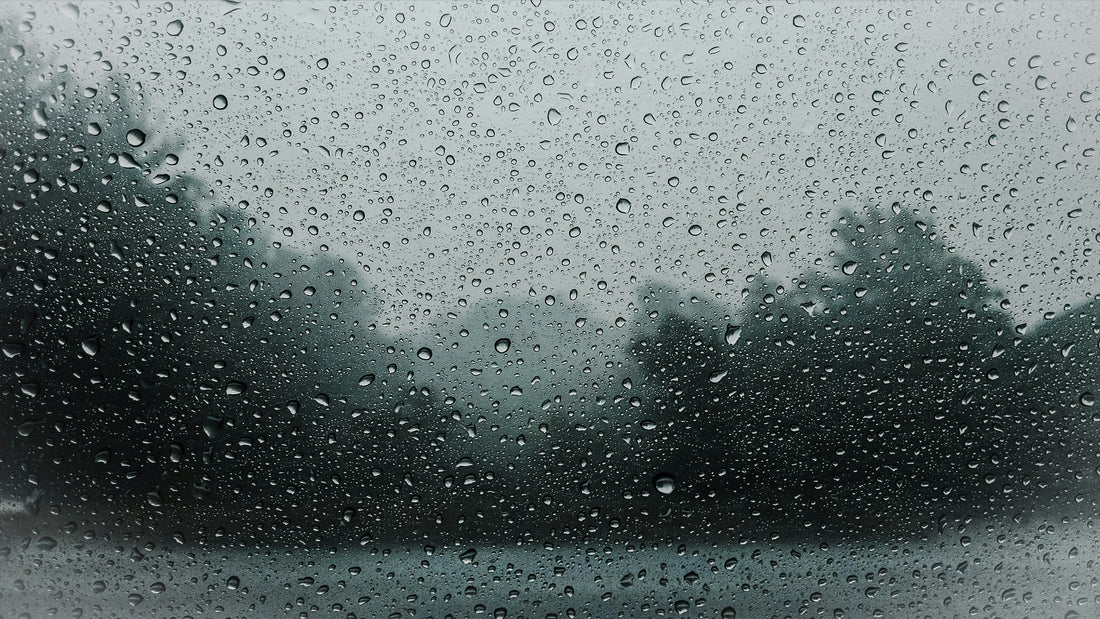
Why Do We Sleep Better When It Rains?
Share
Why Rain Makes Sleep So Much Better
Have you ever noticed how you sleep more soundly when it's raining outside? You're not alone—many people report deeper, more restful sleep during a rainstorm. While it might seem like a cozy coincidence, there’s actually some science (and psychology) behind why rain helps us drift off more easily.
1. Rain Sounds Are Naturally Soothing
The soft patter of rain on the roof or windows acts like a form of white noise, which masks other, more jarring environmental sounds like traffic, barking dogs, or noisy neighbors. This steady, consistent sound helps lull the brain into a relaxed state, making it easier to fall—and stay—asleep.
Researchers have found that white noise can significantly improve sleep quality, especially in environments with unpredictable sound patterns. Rain, with its gentle rhythm and low-frequency tones, is basically nature’s perfect sleep soundtrack.
Think about how many sleep apps or meditation playlists use rain sounds as their default option—it’s because our brains find the pattern soothing and predictable. The human brain loves rhythms, especially repetitive ones. Unlike sudden noises that jolt us awake, rain produces a continuous background that blends into the subconscious, making it easier to enter deeper stages of rest.
If you don’t live in a rainy climate, you can mimic the effect with a white noise machine or a rainfall playlist. Some devices even allow you to mix sounds—like thunder in the distance or ocean waves with rain—for a custom “sleep storm.”
2. Lower Light Levels Signal Sleep Time
Rainy weather usually means overcast skies, which naturally dim the amount of sunlight entering your room. Less light triggers the body to produce more melatonin, the hormone responsible for regulating sleep. So, on rainy days and nights, your body may get the signal to power down earlier and stay in sleep mode longer.
Even artificial light from street lamps or car headlights is often muted by rain, helping create a darker, more sleep-friendly environment. Since our circadian rhythm relies heavily on light cues, a rainy evening acts like nature dimming the switch for bedtime.
If you’re someone who struggles with insomnia or a “racing mind” at night, those darker skies can provide a nudge to your internal clock. Pair the rainy-day dimness with warm indoor lighting—like soft lamps or candles—and you’re creating an environment that practically invites your body to unwind.
3. Cooler Temperatures Help with Sleep Onset
Rain often comes with a drop in temperature, especially during the evening. That’s great news for sleep. Our body temperature naturally dips at night, and a cooler environment can help signal to your body that it's time to rest.
Studies show that cooler room temperatures—ideally around 60 to 67°F (15 to 19°C)—are optimal for sleep. If the rain helps bring the temperature down to that sweet spot, it could be a major reason you're snoozing more soundly.
A cooler environment doesn’t just help you fall asleep faster—it also supports deeper sleep. Core body temperature plays a role in regulating slow-wave sleep, which is the most restorative stage of the sleep cycle. That’s why many people wake up groggy and restless after trying to sleep in a hot, stuffy room.
On rainy nights, when the air is crisp and cool, your body can more easily hit that natural “sleep zone.” Want to maximize the effect? Crack open a window to let in the fresh, slightly damp air—or use breathable bedding that helps regulate your temperature.
4. Psychological Comfort and Calm
For many people, the sound of rain evokes a feeling of nostalgia or comfort. Maybe it reminds you of being safely tucked in bed during a storm as a kid, or sipping tea while watching droplets slide down the windowpane. This psychological association with safety and calm can ease anxiety, lower stress, and create the perfect mental state for falling asleep.
Even in evolutionary terms, being sheltered from the elements during a storm might signal “all is well,” giving your brain permission to fully relax. There’s something deeply reassuring about hearing the storm outside while you’re warm and protected indoors.
This sense of security can also help reduce cortisol levels, the body’s main stress hormone. High cortisol makes it harder to fall asleep and stay asleep, so anything that lowers it—like the cozy association of rain—naturally improves sleep quality.
5. A Break from the World’s Hustle
Let’s be honest: rain slows things down. People cancel plans, traffic eases, and there's less pressure to be “on.” That slower pace can extend into your evening routine. Fewer distractions and a more tranquil environment make it easier to wind down, turn off screens, and prioritize rest.
Rainy weather also encourages rituals of comfort: reading, journaling, sipping something warm, or wrapping yourself in a blanket. These activities aren’t just cozy—they serve as natural cues for your body to transition toward sleep mode.
In today’s fast-paced world, where we’re constantly overstimulated, rain provides a natural pause button. It gives us permission to rest without guilt. After all, if the world outside is slowing down, why shouldn’t we?
So...
While we can’t control the weather, we can learn from how it affects our bodies and minds. Rainy nights offer the perfect blend of soothing sound, cool air, and psychological comfort. By paying attention to these natural sleep aids, we can recreate some of their benefits even when the skies are clear.
The next time the clouds roll in and the drops start falling, take a deep breath, snuggle into your sleep hoodie, and let nature’s lullaby do its thing.
